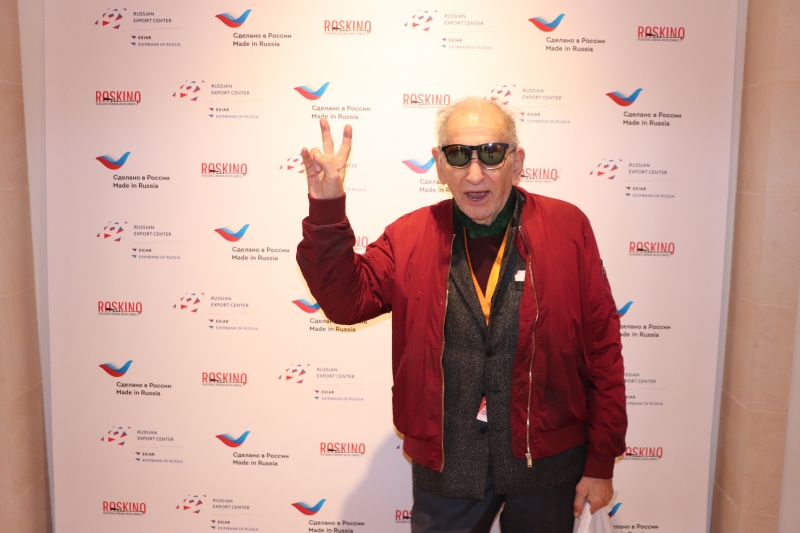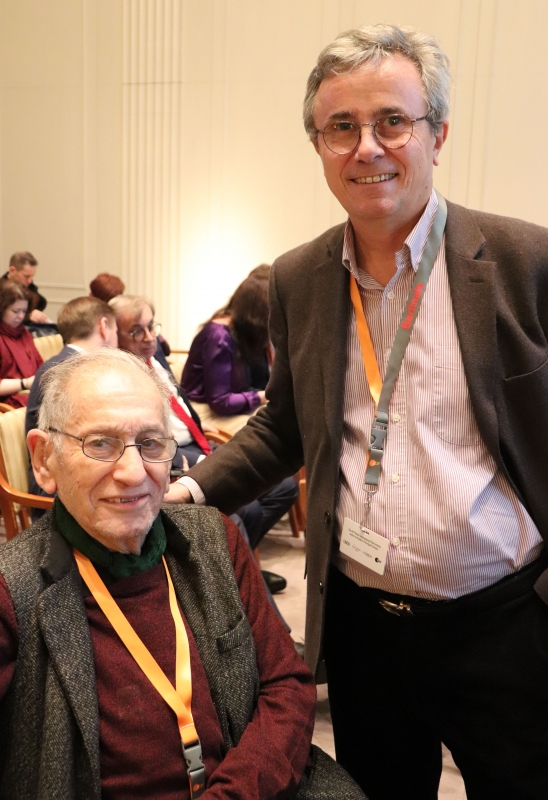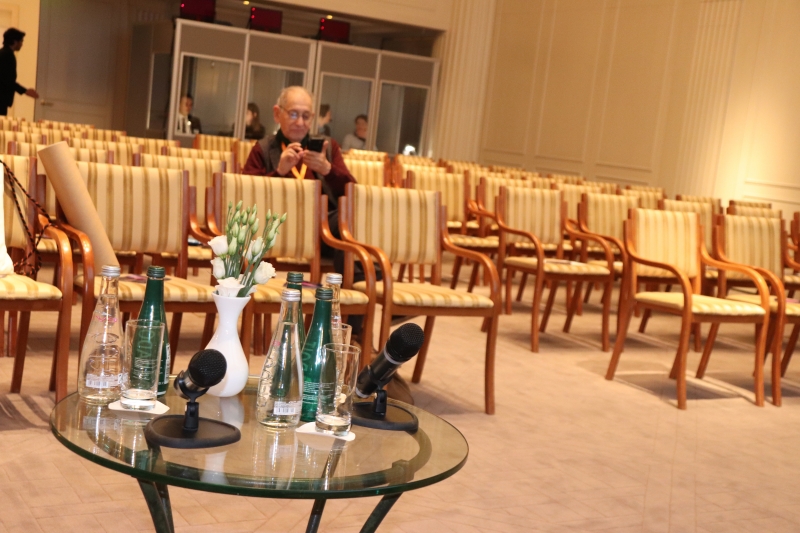|
|
||
|
Pro Tools
FILMFESTIVALS | 24/7 world wide coverageWelcome ! Enjoy the best of both worlds: Film & Festival News, exploring the best of the film festivals community. Launched in 1995, relentlessly connecting films to festivals, documenting and promoting festivals worldwide. Working on an upgrade soon. For collaboration, editorial contributions, or publicity, please send us an email here. User login |
Alex at the 22nd Kerala Film FestivalMy Top Seven from the festival were: 1. A mon âge je me cache toujours pour fumer -- ALGERIA 2. Newton --HINDI 3. Two Persons, Malayalam 4. Heart of a Dog --Malayalam 5. Black Jew, Malayalam 6. The Butcher, The Whore, and the One-eyed Man, Another Hungarian chef d'oeuvre from János Szász 7. WAJIB, Palestine Details on these films to follow later Alex, Trivandarum Nayinye Hrudayam, (The Heart of Dog) Is a canine teaser that throws out the cinematic rule book at the 22nd Kerala Film Festival by Alex C. Deleon <filmfestivals.com> H.O.A.D is the most unusual film of the festival in a festival that abounds in unusual films. It is based on the satirical Russian novel "Heart of a Dog" (Собачье сердце) by Mikhail Bulgakov written in 1925 as a searing attack on Communism but thoroughly transformed here to match South Indian sensitivities and perceptions. In terms of style this film is beyond style. As the saying goes, you have know the rules in order to break them and Mr. Sreekrishnan has broken or deconstructed just about every rule in the rulebook on how to tell a story on celluloid. A full discussion based on our interview will come later. For the moment suffice it to say that the contentional bones of the story are about a man being changed into a dog via surgical intervention and then being changed back to his human form resulting in phantasmagorical complications for all involved. The narrative style of the film was so challenging that it generated a continual stream of walkouts with viewers giving up the effort to follow the proceedings at various points in the picture until the hall was about half empty but those who hung on doggedly to the end were rewarded with enlightening remarks by the director which served to at least partially untangle the ordeal of incomprehension. Not for every taste ~only for hardcore cinephiles willing to suspend all cinematic preconceptions going in and coming out. Bring forewarned see it and have a ball!
I saw 2 films today; might head to restaurant for quick lunch and skip an aft film. Exceptional Indian Study of Schizophreniai
Author: alexdeleonfilm from Budapest Viewed at the River to River Indian film festival, Firenze, December 2005. The title of Aparna Sen's latest film, "15 Park Avenue", is an oblique reference to that most exclusive of New York streets where many of the wealthiest people in America used to have their private residences. Meethi, an attractive young woman who can be very charming and appealing in her lucid moments, suffers from extreme delusions and has been diagnosed as incurably schizophrenic, although for a time she was engaged to a sincere young man whom she called Jojo.
Jojo was aware of her condition but deeply in love, however, when her spells became too traumatic, the wedding was called off and he married another woman. Meetha has always been under the care of her much older, intellectual, and domineering sister Anjali. Anjali, herself a very attractive divorced woman of a certain age, supports the family consisting of herself, her sister and their aged mother (Waheeda Rahman!) by lecturing on Nuclear Physics and Quantum Mechanics at the local university -- (a nice touch attesting to India's highly advanced state in the theoretical sciences, of which there is precious little awareness in the Western world).
A middle-aged academic colleague of hers keeps throwing himself at her feet, but Anjali has become much more interested in the white-haired psychiatrist, Kuman, who has been called in as a consultant on Meethi's difficult case and is more of an intellectual challenge to her. This is also a tricky relationship because Kuman is still committed to his own marriage, though obviously interested in the still very attractive quantum professorial Anjali. (Who wouldn't be!) To complicate matters even more, Jojo who has been out of the picture for years with wife and young children, suddenly reappears to share in Meethi's delusionary world which has long been centered in her disturbed mind on the fixation of being happily married to him and living at number "15 Park Avenue" in Bombay -- an address which doesn't exist except in her imagination -- During this chance meeting at a Himalayan mountain resort Meethi fails to recognize him as her long-lost Jojo, but accepts his complicity in her dream world as she feels that everyone else is against her. In the strangely mystical ending of the address on the Monopoly board which is mistakenly mentioned as "Park Avenue" at several points in the film ... (On the Monopoly board it's Park Place)
There is actually much more to this picture than the cursory plot summary above might indicate, for the insights it provides into the lives of the contemporary Indian intelligentsia as well as for the depiction of the constant battle between cold rationalism and subjective emotionalism which is a leit motif throughout the film. The dialogue, especially in the first half of the picture, may sound excessively stiff and unreal to Western ears, but, apparently, this is the way westernized Indian intellectuals talk. Moreover, the Freudian analyses which take up much of the second half of the film, sound like a throwback to Hollywood movies of the forties when Freud was all the thing -- and makes it seem like the Indians of today are just now catching up on long over-baked Western psychology ...
However -- and it is a big "however" -- whatever the trivialities of the plot from a jaded western point of view it is the personalities of the players, the excellence of the acting, and the humanitarian warmth throughout which makes all else secondary.
There are really two, if not three central figures: (1) Meethi, the disturbed young lady as portrayed by Konkona Sen Sharma, a talented actress who happens to be the daughter of director Aparna Sen, (2) the charismatic Shabana Azmi who portrays the older protective sister and is one of India's leading older movie stars -- to see her is to understand why, and (3) "Jojo" -- the long-lost lover with an overweaning sense of responsibility, played by now 40 year old actor Rahul Bose, a favourite leading man of the director's and an unforgettable presence of every film he's in. Whether a striking piece of work like this will ever be seen outside of festivals is an open question, however it seems to me that an enterprising American distributor could do very well with this pic because it has universal appeal and universally appealing performers.
21.12.2017 | ALEX FARBA's blog Cat. : FESTIVALS
|
LinksThe Bulletin Board > The Bulletin Board Blog Following News Interview with IFTA Chairman (AFM)
Interview with Cannes Marche du Film Director
Filmfestivals.com dailies live coverage from > Live from India
Useful links for the indies: > Big files transfer
+ SUBSCRIBE to the weekly Newsletter Deals+ Special offers and discounts from filmfestivals.com Selected fun offers
> Bonus Casino
User imagesAbout ALEX FARBAThe Editor |





























